Overview
Proven strategies for success in advanced manufacturing recruitment encompass:
- Leveraging technology
- Investing in targeted training
- Cultivating a robust employer brand to attract and retain top talent
The integration of AI and automation significantly enhances hiring efficiency, while tailored recruitment solutions, coupled with a focus on cultural fit, effectively address the skills gap and elevate overall candidate engagement in a fiercely competitive market.
Key Highlights:
- The advanced manufacturing sector is transforming due to technological advancements, workforce changes, and sustainability initiatives.
- By 2025, 25% of industry leaders are expected to use AI to improve hiring efficiency, highlighting a shift towards technology-driven recruitment.
- Automation is reshaping job roles, creating a skills gap as candidates often lack necessary technical skills.
- Key positions in demand include Chief Technology Officers, Engineers, and Systems Administrators, necessitating tailored recruitment strategies.
- Staffing team turnover is a significant disruptor in hiring, leading to the need for enhanced training and automation in recruitment processes.
- Boutique Recruiting offers customized recruitment solutions to address the specific needs of the advanced manufacturing sector.
- Companies should invest in training and collaborate with educational institutions to build a skilled workforce pipeline.
- Cultural fit is crucial in recruitment; aligning organizational culture with candidate values can improve hiring outcomes.
- Utilizing technology like ATS and AI tools streamlines hiring processes and enhances candidate engagement.
- A strong employer brand attracts top talent by clearly communicating company values, culture, and growth opportunities.
- Effective onboarding and ongoing employee development are essential for retention, especially in a competitive job market.
Introduction
The advanced manufacturing sector stands at a pivotal crossroads, propelled by rapid technological advancements and evolving workforce dynamics. Companies are striving to innovate and uphold their competitive edge, yet the recruitment landscape has grown increasingly complex. This complexity is underscored by a heightened emphasis on automation and artificial intelligence. As the industry anticipates significant shifts by 2025, particularly a marked reliance on AI for hiring efficiency, the challenge of bridging the skills gap looms large. Organizations find themselves not only competing for talent within their sector but also facing fierce competition from other industries.
What strategies can be employed to navigate this evolving recruitment terrain? This article delves into the multifaceted challenges and strategic approaches necessary for success in advanced manufacturing. Embracing technology, building a robust employer brand, and enhancing candidate engagement are paramount to securing the talent essential for future success. As the landscape evolves, addressing these challenges head-on will not only position organizations favorably in the market but also ensure they attract and retain the skilled workforce necessary to thrive.
Navigating the Advanced Manufacturing Recruitment Landscape
The advanced manufacturing sector is undergoing a significant transformation, propelled by rapid technological advancements, shifting workforce demographics, and evolving industry demands. As companies strive to innovate and maintain a competitive edge, the advanced manufacturing recruitment landscape has become increasingly intricate. Notable trends include a pronounced emphasis on automation, the integration of artificial intelligence in production processes, and a growing commitment to sustainability initiatives.
In 2025, approximately 25% of industry leaders are expected to leverage AI to enhance hiring efficiency, reflecting a broader trend towards technology-driven hiring solutions. This shift necessitates that recruiters in advanced manufacturing recruitment not only adapt their strategies but also understand the implications of these technologies on the workforce. The rise of automation is reshaping job roles, requiring candidates to possess advanced technical skills that many current job seekers may lack, thereby exacerbating the existing skills gap in the industry.
Key positions like Chief Technology Officers, Engineers, and Systems Administrators are increasingly in demand, highlighting the need for advanced manufacturing recruitment strategies. Moreover, the advanced production sector faces unique challenges, such as staffing team turnover, which has been identified as a significant disruptor in hiring processes. This turnover complicates the management of candidate flow, particularly as competition for talent intensifies and dropout rates among candidates rise. To tackle these challenges, industry leaders are acknowledging the significance of enhancing their hiring strategies for advanced manufacturing recruitment teams through focused training and the implementation of automation tools to reduce workloads and improve hiring efficiency.
A recent case study emphasized that staffing team turnover was a significant disruptor in the hiring landscape, leading to the acknowledgment of the necessity for enhanced staffing team capacity through training and automation. It is crucial for hiring managers to handle the interview process seamlessly to avoid losing top talent.
In this context, Boutique Recruiting provides advanced manufacturing recruitment solutions that are customized to the specific needs of the production industry, ensuring that companies can attract the right talent. By focusing on seamless interview processes and understanding the unique demands of technical and HR roles, such as Compensation & Benefit Managers and HR Directors, Boutique Recruiting positions itself as a strategic partner in navigating the talent war. Additionally, significant investments in clean technology production have continued throughout 2024, although there has been a decline since 2023, with some automakers reducing investment in electric vehicles.
This context underscores the importance of adapting recruitment strategies, particularly advanced manufacturing recruitment, to align with industry shifts. Furthermore, overcoming interoperability challenges and prioritizing cybersecurity will be crucial for success in smart operations, making these considerations essential for recruiters.
As Jake Link, Director of Content for GoodTime, notes, “Recruiters in advanced manufacturing recruitment must stay ahead of the curve by understanding the evolving landscape and the skills required for future roles.” By remaining aware of current trends and the influence of technological innovations, recruiters can enhance their ability to attract and retain the high-quality talent crucial for success in advanced industries.
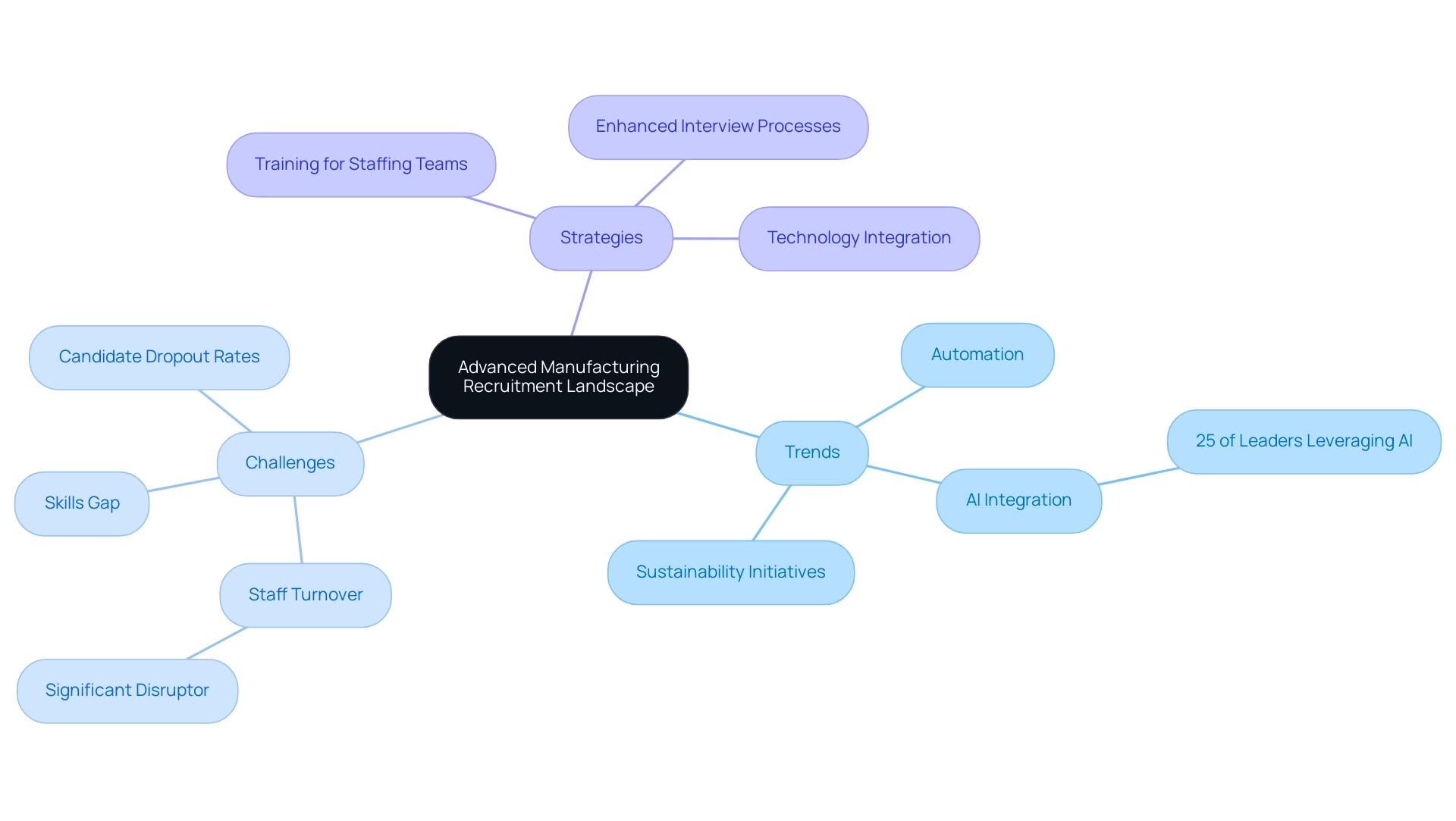
Identifying and Overcoming Recruitment Challenges in Advanced Manufacturing
Advanced manufacturing recruitment presents unique challenges, primarily driven by a pronounced skills gap, intense competition for qualified individuals, and the critical need for cultural alignment within organizations. Roles in this sector, such as Chief Technology Officer, Engineer, and HR Director, require specialized skills that are increasingly scarce, complicating the search for suitable candidates. As the industry evolves, companies face competition not only from each other but also from other sectors vying for the same top talent across the U.S. and Canada.
To effectively address these challenges, organizations should consider several strategic approaches:
- Investing in targeted training programs can help bridge the skills gap, equipping potential candidates with the necessary expertise.
- Collaborating with educational institutions to establish a robust pipeline of skilled workers is another effective strategy, ensuring a steady flow of talent into the manufacturing sector.
Moreover, as highlighted by recent trends, manufacturers are increasingly leveraging generative AI tools to enhance customer experience and drive product innovation. However, significant obstacles related to data quality and integration can hinder successful AI implementation.
Refining hiring processes to prioritize cultural fit is essential. This involves a thorough understanding of organizational culture and aligning it with the values and expectations of potential hires. As Jake Link, Director of Content for GoodTime, observes, “Developing top-tier resources for hiring professionals is essential in tackling these challenges.”
Boutique Recruiting stands out as a trusted partner in this endeavor, offering tailored talent acquisition solutions that specifically cater to the needs of advanced manufacturing recruitment in the production, healthcare, and tech industries.
By proactively addressing these challenges, companies can significantly enhance their hiring strategies through advanced manufacturing recruitment, securing the talent necessary to thrive in the competitive landscape of advanced production. Recent statistics indicate that a diesel engine manufacturer aims for a 25% reduction in product lifetime greenhouse gas emissions by 2030, underscoring the industry’s commitment to sustainability and its implications for workforce engagement. As manufacturers continue to invest in generative AI applications, focusing on use cases that align with critical business initiatives, they must also address the skills gap in the workforce.
This dual approach is expected to enhance efficiency and productivity, ultimately leading to a more capable and competitive manufacturing sector by 2025. Boutique Recruiting’s impressive track record of success and its reputation as a valuable ally in navigating hiring challenges further reinforce the effectiveness of these strategies. Reach out to us to discover more about how we can assist you in your hiring efforts.
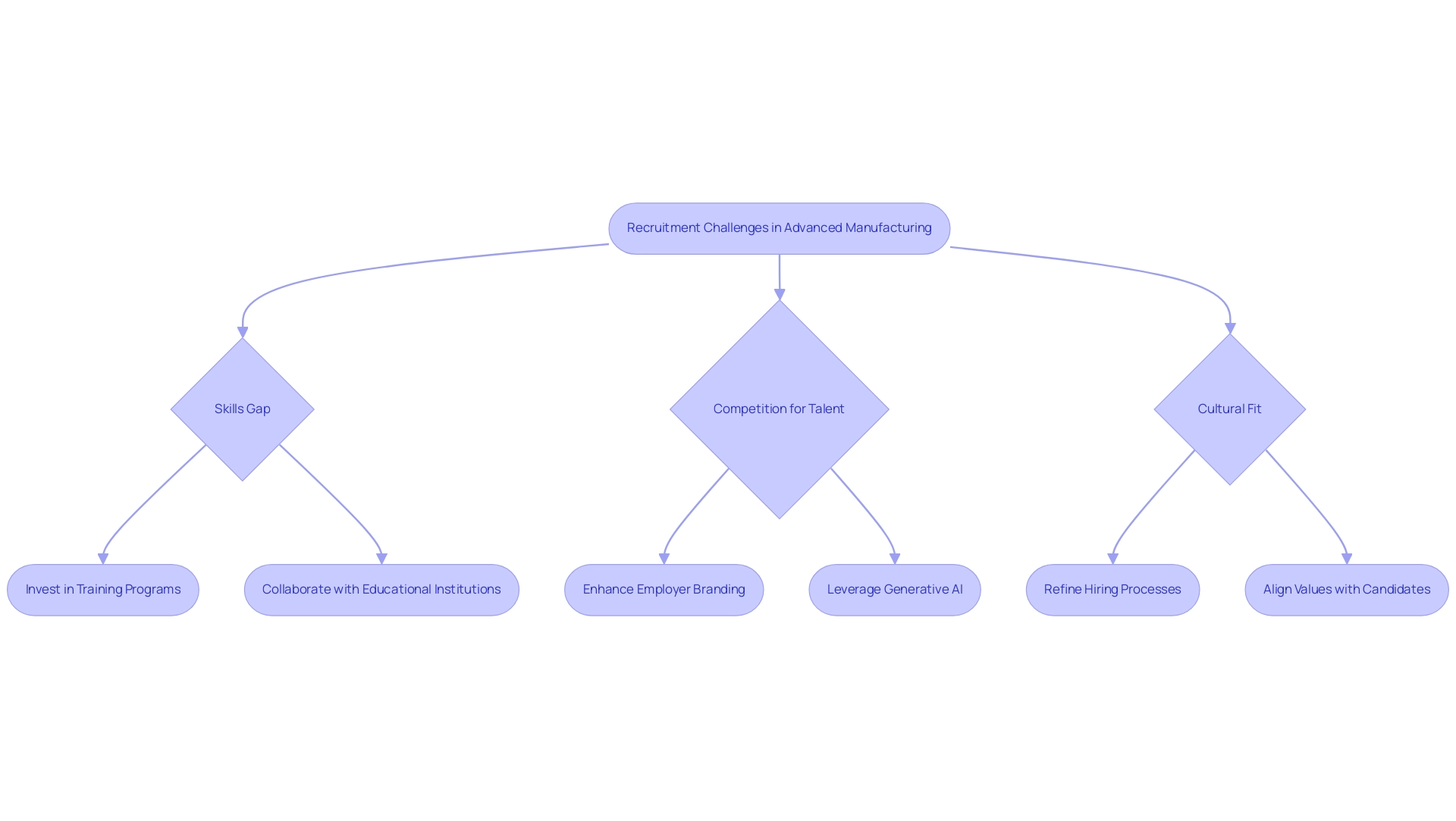
Harnessing Technology for Effective Recruitment Strategies
In the contemporary digital landscape, technology is integral to effective hiring strategies, particularly in advanced manufacturing recruitment. Companies in this sector can leverage tools such as applicant tracking systems (ATS), AI-driven hiring platforms, and social media to streamline their hiring processes. These technologies not only facilitate efficient applicant screening but also automate repetitive tasks, allowing recruiters to focus on strategic decision-making.
Boutique Recruiting stands out with its custom hiring solutions tailored for technical and HR roles across various industries, including manufacturing, healthcare, and tech. They specialize in roles such as:
- Chief Technology Officer
- Engineer
- Solution Architect
- Systems Administrator
- HR positions
Their customized method guarantees that the distinct requirements of every client are fulfilled, improving the overall hiring experience for both employers and applicants.
The implementation of ATS has proven beneficial, with organizations reporting significant improvements in their hiring efficiency. For instance, in 2024, 50% of candidates indicated that automated scheduling features enhanced their application experience, showcasing the value of technology in creating a more user-friendly hiring process.
Moreover, the production sector is undergoing a substantial digital transformation, with 98% of surveyed producers initiating their digital journeys. This shift is driven by the need for cost optimization, operational efficiency, and product innovation. As manufacturers prioritize investments in digital technologies, including AI, cloud solutions, and 5G, they are better equipped to tackle challenges such as rising material costs and labor shortages.
Nonetheless, it is crucial to highlight that there has been a decrease in funding for electric vehicles, which may influence advanced manufacturing recruitment in the hiring environment.
By embracing these technological advancements, advanced manufacturing recruitment can help organizations enhance their operational capabilities and attract a broader range of qualified individuals. Today’s job seekers are increasingly attracted to tech-savvy employers, making it essential for companies to adopt innovative hiring practices. Utilizing data analytics further allows recruiters to gain insights into applicant behavior and preferences, enabling a more personalized recruitment experience that resonates with potential hires.
Boutique Recruiting’s commitment to website accessibility ensures that all individuals, including those with disabilities, can engage with their services effectively. Their website features tools like the UserWay accessibility widget, which enhances user experience and demonstrates their dedication to inclusivity.
The engagement and applicant inquiry process at Boutique Recruiting is designed to be seamless and supportive, ensuring that individuals feel valued and informed throughout their journey. As Eric Eddy from CPA Resources Global Professionals pointed out, Boutique Recruiting has shown “the firm’s capability to provide top-notch candidates swiftly and effectively,” which highlights the success of their customized strategy for hiring. In summary, the incorporation of technology in advanced manufacturing recruitment processes is not merely a trend but an essential requirement for advanced firms aiming to thrive in a competitive job market.
By harnessing these tools and maintaining a commitment to accessibility, organizations can position themselves as attractive employers while ensuring they secure the best talent available.
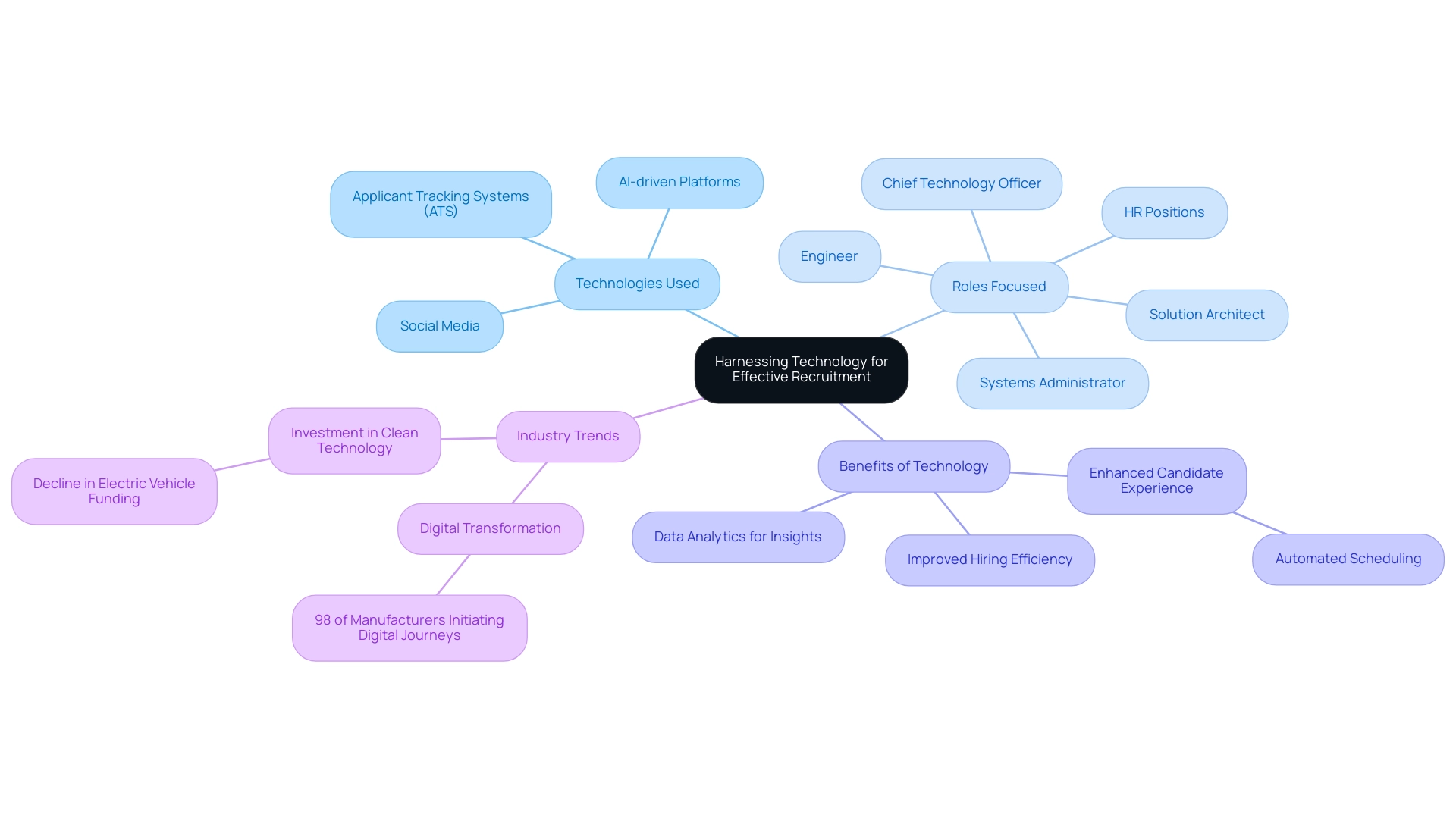
Building a Strong Employer Brand to Attract Top Talent
A robust employer brand is essential for attracting top talent in the advanced manufacturing sector, especially in high-demand finance and technology roles such as CFOs, Financial Managers, and Directors of Finance. This underscores the critical nature of advanced manufacturing recruitment. Companies must prioritize the clear communication of their values, culture, and the unique benefits they offer to employees. This requires showcasing opportunities for career advancement, emphasizing a commitment to innovation, and highlighting employee success stories.
Engaging current employees to gather testimonials and feedback enhances the authenticity of the employer brand, making it more relatable to potential hires.
In today’s competitive environment, where the best candidates are not merely seeking any position but the right role with the right organization, it is imperative for hiring managers to conduct the interview process seamlessly. Candidates are actively evaluating organizations for red flags during interviews, making it crucial that businesses present themselves effectively. Statistics reveal that 73% of organizations recognize well-defined job descriptions and clear expectations as vital for attracting potential hires.
Furthermore, organizations that prioritize transparency, flexibility, and competitive pay are more successful in their advanced manufacturing recruitment efforts, as emphasized in the case study on attraction strategies. By presenting themselves as appealing workplaces, organizations can enhance advanced manufacturing recruitment by attracting candidates who not only possess the necessary skills but also resonate with the mission and values. This alignment is essential for fostering a positive organizational culture, significantly impacting talent attraction and retention.
In 2025, the significance of employer branding in recruitment cannot be overstated. Companies that actively build their employer brand can expect to see improved engagement and retention rates, as 70% of employers cite engagement as key to retaining talent. Anh Nguyen, a content creator and HR software reviewer, emphasizes this point, stating, “With 70% of employers citing engagement as key to retention, engagement platforms monitor employee satisfaction through real-time surveys and feedback tools.”
Additionally, with 40% of organizations prioritizing employee assistance programs (EAPs) to provide mental health resources, employers are taking proactive steps to reduce burnout and enhance long-term retention.
Effective employer branding tactics in the industrial sector involve utilizing social media to highlight company culture and values, along with nurturing a genuine atmosphere that appeals to prospective applicants. By focusing on these elements, organizations can create a compelling narrative that attracts high-quality talent and ultimately leads to a more engaged and satisfied workforce. Customized hiring solutions from Boutique Recruiting can further enhance these efforts, ensuring that employers not only attract but also retain exceptional talent.
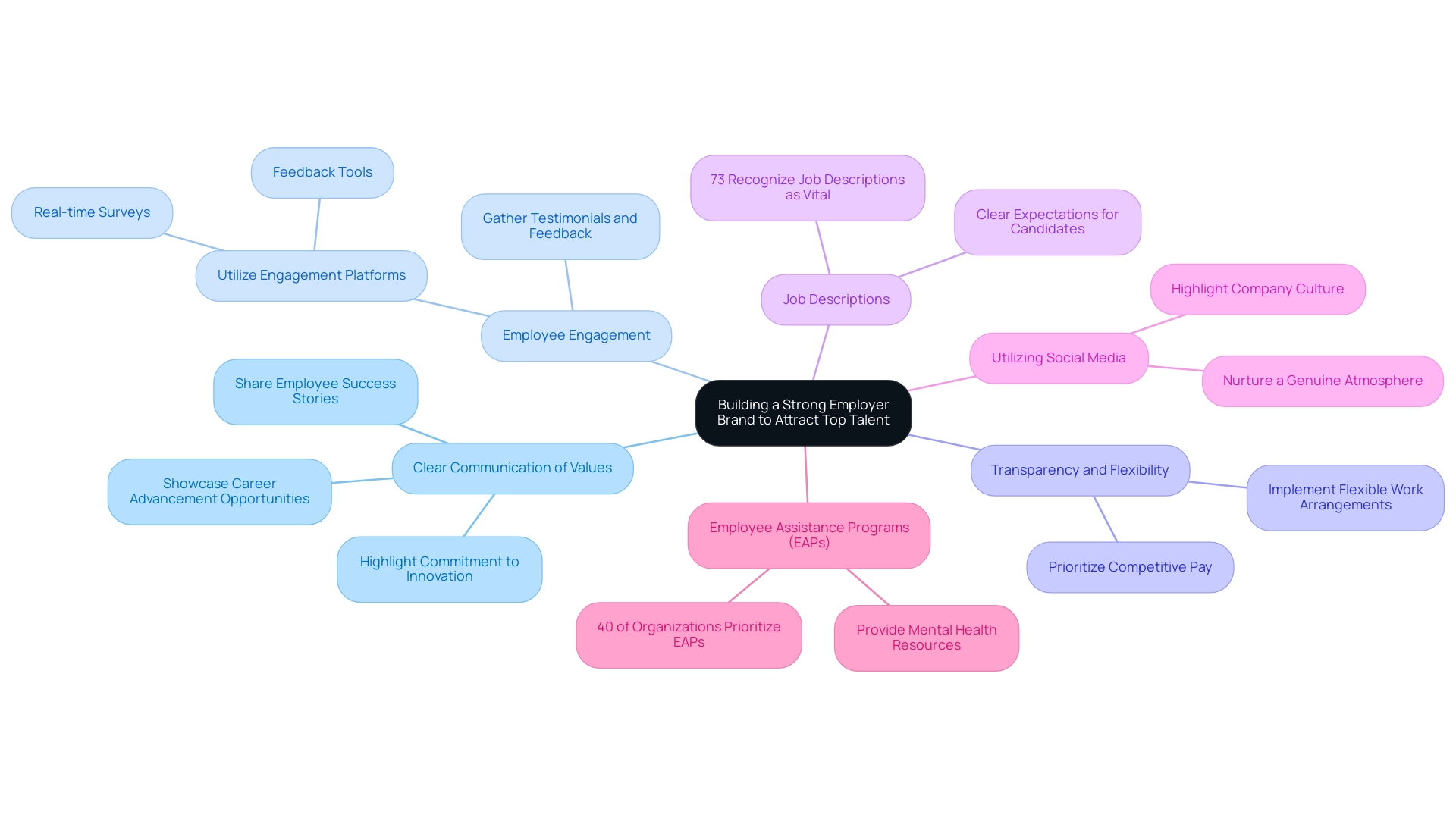
Enhancing Candidate Engagement and Retention in Manufacturing Recruitment
Enhancing applicant engagement is crucial for successful advanced manufacturing recruitment and retention in healthcare and tech industries. Organizations must prioritize clear communication throughout the hiring process, ensuring applicants receive timely updates and constructive feedback. This approach not only fosters trust but also enhances the overall candidate experience, which is vital in today’s competitive talent landscape.
At Boutique Recruiting, we recognize that personalized onboarding experiences significantly contribute to making new hires feel welcomed and valued from their first day.
Research indicates that effective onboarding can dramatically improve retention rates, particularly in manufacturing, where the industry anticipates a 51% increase in recruitment team turnover challenges in 2025. By investing in comprehensive onboarding programs, organizations can create a supportive environment that encourages new employees to thrive. Our careful method of comprehending organizational culture and specific job requirements enables us to provide individuals who fit well within businesses, further improving the onboarding experience.
Furthermore, promoting a culture of ongoing learning and development is vital for maintaining employee engagement and motivation. Organizations that prioritize professional growth are more likely to retain talent, as employees feel their contributions are recognized and valued. Regularly seeking input from employees can assist in pinpointing areas for enhancement, ensuring that the workplace continues to be favorable for growth and satisfaction.
Case studies show that companies emphasizing clear communication and appealing benefits are more successful in attracting applicants. Features such as automatic rescheduling and convenient automated scheduling have emerged as key improvements for applicants, alongside flexible work arrangements and competitive salaries, which are particularly important in the competitive landscape of advanced manufacturing recruitment. As Eric Eddy from CPA Resources Global Professionals observes, Boutique Recruiting’s ability to deliver top-notch individuals quickly and efficiently underscores the effectiveness of these engagement strategies.
To engage with Boutique Recruiting, individuals can submit their information through our inquiry process, ensuring they fill out all required fields, including their name, phone number, and whether they are a job seeker or hiring manager. It is also essential for candidates to be forthcoming about their workstyle preferences and salary expectations during the hiring process. By implementing these strategies, organizations can build a loyal workforce that significantly contributes to long-term success, while also embracing transparency and authenticity throughout the recruitment process.
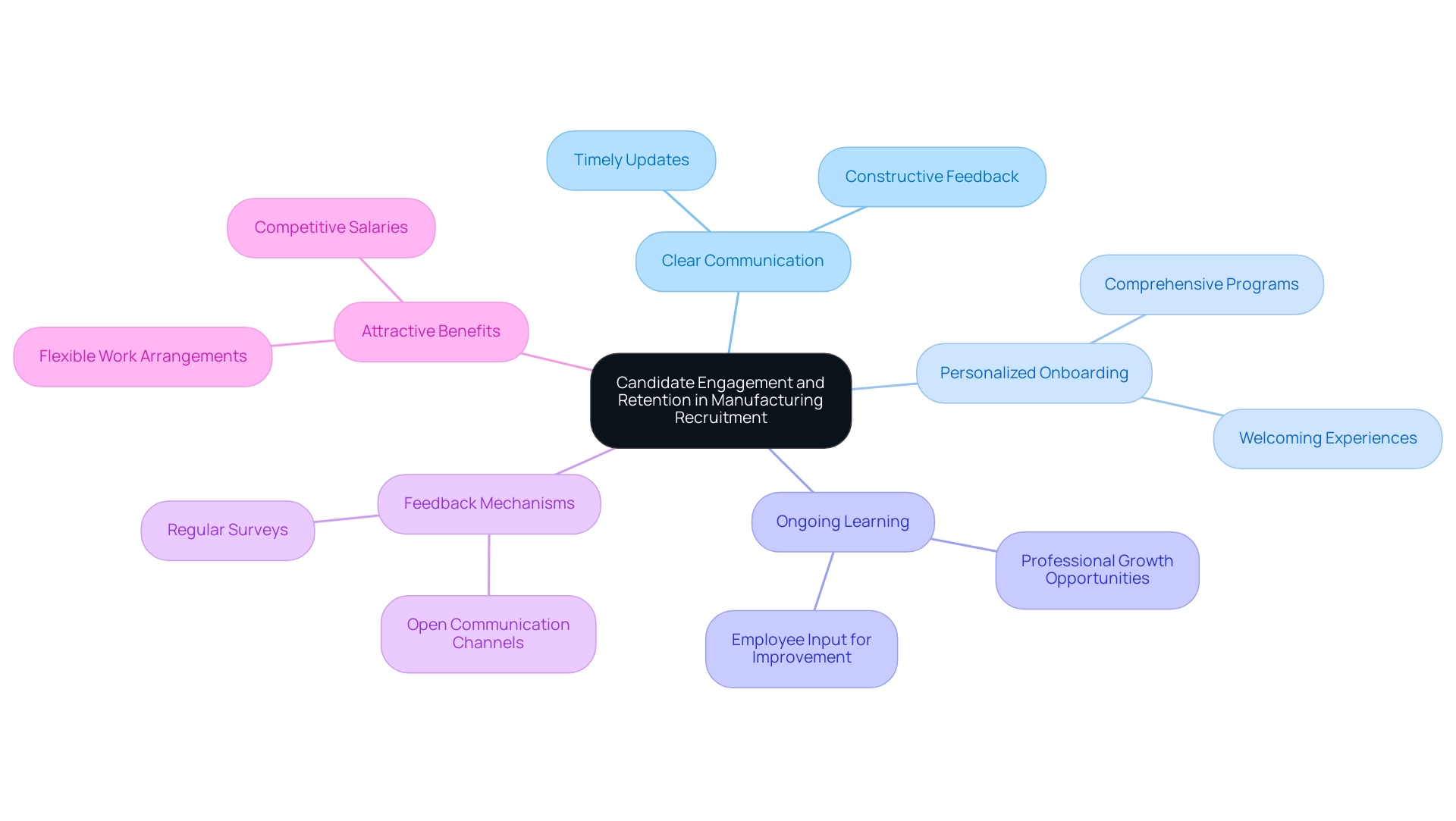
Conclusion
The advanced manufacturing sector is navigating a transformative period characterized by rapid technological advancements and an evolving workforce. Organizations face significant challenges in recruitment, primarily due to a pronounced skills gap and fierce competition for qualified candidates. To successfully attract and retain top talent, companies must embrace strategic approaches, including:
- Targeted training programs
- Collaboration with educational institutions
- The integration of technology into recruitment processes
The importance of a robust employer brand cannot be overstated. By effectively communicating their values and culture, organizations can create a compelling narrative that resonates with potential hires. Engaging current employees to share their experiences enhances authenticity and helps build trust with candidates. Furthermore, organizations that prioritize clear communication, transparency, and a supportive onboarding experience are more likely to see improved engagement and retention rates.
As the industry continues to evolve, leveraging technology will be essential for streamlining recruitment processes and enhancing candidate engagement. The integration of AI-driven tools and applicant tracking systems not only optimizes hiring efficiency but also attracts a broader pool of talent. Ultimately, the strategies discussed in this article are critical for positioning advanced manufacturing organizations to thrive in a competitive landscape, ensuring they not only attract the right talent but also foster a culture that promotes long-term success and innovation.
Frequently Asked Questions
What is driving the transformation in the advanced manufacturing sector?
The transformation is driven by rapid technological advancements, shifting workforce demographics, and evolving industry demands, including a focus on automation, artificial intelligence integration, and sustainability initiatives.
How is artificial intelligence expected to impact hiring in advanced manufacturing by 2025?
By 2025, approximately 25% of industry leaders are expected to leverage AI to enhance hiring efficiency, indicating a shift towards technology-driven hiring solutions.
What skills are increasingly required for candidates in advanced manufacturing?
Candidates are required to possess advanced technical skills, particularly as automation reshapes job roles, which many current job seekers may lack, exacerbating the existing skills gap.
What key positions are in high demand within the advanced manufacturing sector?
Key positions in demand include Chief Technology Officers, Engineers, and Systems Administrators.
What challenges does advanced manufacturing recruitment face?
The sector faces challenges such as staffing team turnover, intense competition for talent, and the need for cultural alignment within organizations.
How can organizations address the skills gap in advanced manufacturing recruitment?
Organizations can invest in targeted training programs and collaborate with educational institutions to create a pipeline of skilled workers.
What role does cultural fit play in the hiring process for advanced manufacturing?
Prioritizing cultural fit is essential for aligning organizational culture with the values and expectations of potential hires, which enhances the effectiveness of the hiring process.
How is Boutique Recruiting positioned to assist in advanced manufacturing recruitment?
Boutique Recruiting offers tailored talent acquisition solutions specifically designed for the needs of the advanced manufacturing sector, helping companies attract the right talent.
What is the significance of sustainability in the advanced manufacturing sector?
The industry is committed to sustainability, as evidenced by goals such as a 25% reduction in product lifetime greenhouse gas emissions by 2030, which impacts workforce engagement and hiring strategies.
What is the expected outcome of addressing the skills gap and leveraging AI in advanced manufacturing?
By addressing the skills gap and implementing AI, manufacturers are expected to enhance efficiency and productivity, leading to a more capable and competitive manufacturing sector by 2025.